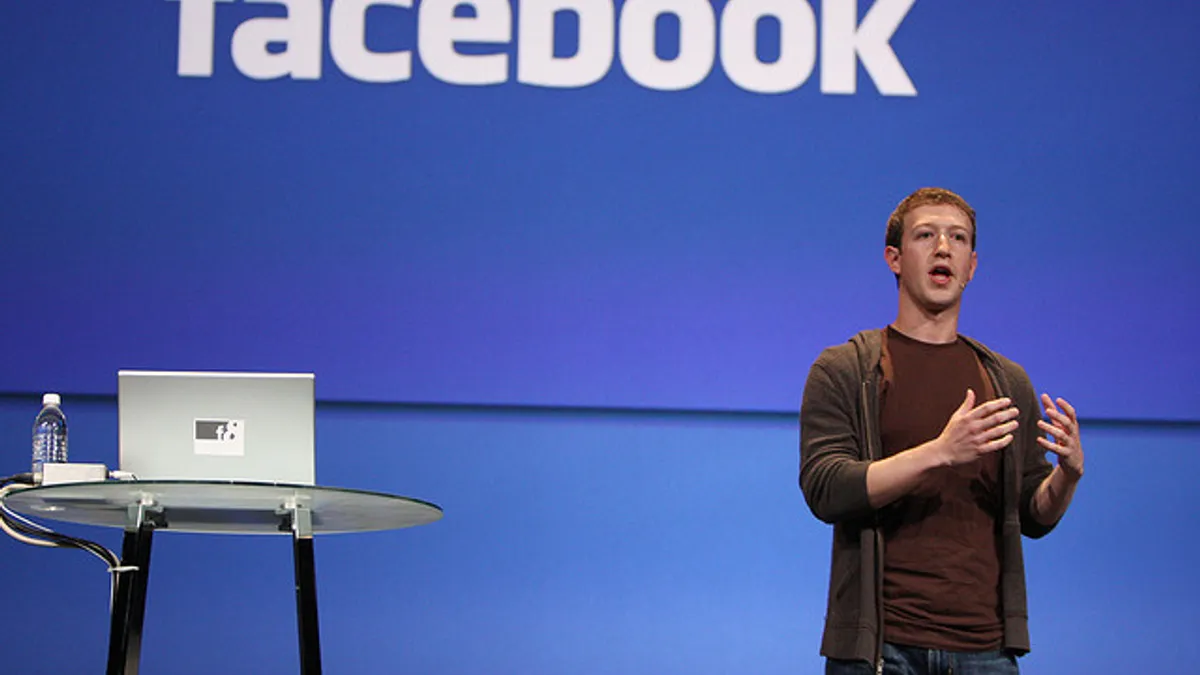Dive Brief:
- Facebook is developing a livestreaming video product for celebrities and big-name content creators, Bloomberg reported, citing a person familiar with the matter. Called Super, the feature lets viewers pay for perks like taking a selfie with the host or asking a personalized question.
- The feature also lets hosts promote merchandise or other offerings for sale through their livestreams. The focus on paid celebrity interactions recalls Cameo, a video shoutout app that has taken off in popularity during the pandemic.
- Super is a project of Facebook's New Product Experimentation (NPE) unit that launched last year and develops experimental bets for the company. While a spokesperson confirmed to Bloomberg that such a product is in development, key details, like whether it will be a standalone app or an add-on to an existing Facebook platform, remain to be seen.
Dive Insight:
Super is still in internal testing, according to Bloomberg, and NPE's mission is centered on smaller digital experiments that Facebook acknowledges aren't always likely to take off. Still, moving to capitalize on a trend driven by apps like Cameo wouldn't be surprising for the social network: If it gains traction, Super could provide a powerful way for the social media giant to leverage a livestreaming boom in tandem with a broad network of creators and celebrities who already use Facebook-owned apps like Instagram to stay in touch with fans.
Cameo has continued an upward trajectory during the pandemic, serving as a moneymaking tool for celebrities who have seen work slow with production challenges related to COVID-19 and the shuttering of entertainment venues. Everyone from A-list athletes to musicians and reality TV personalities like Carole Baskin, of Netflix's hit series "Tiger King," are present on the service, which lets creators set different prices for custom videos. Brian Baumgartner, the actor known for playing Kevin on NBC's "The Office," made over $1 million from Cameo videos this year, the app's co-founder and chief executive Steven Galanis told New York Times columnist Kara Swisher earlier this month.
Facebook is also well-known for copying features popular on other apps, most famously Stories, a disappearing photo- and image-collage format that originated on Snapchat. Stories are now a cornerstone of both the Facebook and Instagram user experience, but Facebook's direct cribbing of competitors' ideas could cool in the wake of two antitrust suits filed last week. Separate complaints from the Federal Trade Commission and more than 40 states allege Facebook is a social media monopoly that wields its outsized influence to either squash or buy rivals.
Beyond the Cameo similarities, Super aligns with other areas where Facebook is building out its products. Livestreaming continues to command the interest of homebound consumers, and Facebook has added tools like virtual tipping to streaming before. Facebook Live launched a tipping feature in 2018 in its race to better compete with Amazon's Twitch, which offers a similar option where viewers can reward their favorite streamers through a digital currency. Merchandise and e-commerce functionalities are also key for Facebook as more people shop from home and creators look for ways to diversify their revenue streams.
The Cameo-like concept is attracting interest in the broader social media sphere. Dubsmash, a video-sharing app similar to TikTok, in November debuted a feature called Shoutout to let users commission videos from their favorite influencers. Dubsmash, which was acquired by Reddit this week, does not take a cut of revenue earned from Shoutout videos in what executives say is a bid to help the platform's diverse creators earn a living, according to Forbes.
While Bloomberg reported it is unclear whether Super will act as a standalone app, NPE's prior work has centered on products that operate independently from the core Facebook suite, such as Collab, another TikTok lookalike. NPE has previously stated products it develops may eventually be layered into existing Facebook platforms.
"[NPE Team] apps will change very rapidly and will be shut down if we learn that they're not useful to people. We expect many failures," Facebook said in blog post unveiling the division last year. "We also want to minimize disruption to the billions of people who use Facebook apps every day."















